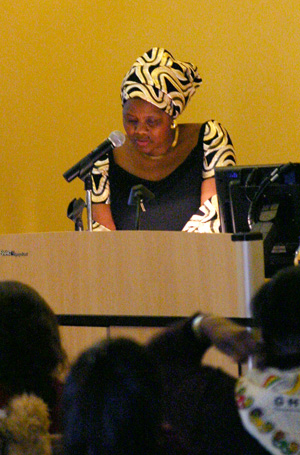Writer Sarah Mkhonza said her native country of Swaziland, a nation of about 1.1 million people in Southern Africa, is a land of kings, queens and palaces. But instead of the royalty in fairytales, Mkhonza said her home is a land where few are privileged and the majority is oppressed by a strict monarchy.
“If I never left [Swaziland] I think I would be dead—that’s what my son told me,” she said. “I never took the time to think about that, but when I did—he’s right.”
Now, Mkhonza, and her son Wakhile are spending two years in Ithaca while Mkhonza writes and teaches at Cornell University through Ithaca City of Asylum (ICOA).
City of Aslyum, an international network to support writers repressed or exiled from their native countries, began in Europe and has grown to include 25 locations around the world. The program includes only two cities in the United States: Las Vegas, established in 2000; and Ithaca, created in 2001. Ithaca has hosted three writers since the asylum’s inception.
The program’s sponsors include Cornell University, Ithaca College, Hobart and William Smith colleges and local non-profit organizations. Cornell carries the bulk of the financial burden, including the writer’s stipend, health insurance and visa sponsorship, said Anne Berger, one of the founders of ICOA and a professor of French at Cornell.
“The world is not a land of freedom and peace—we know that,” Berger said. “It takes different forms, but [oppression] happens everywhere. That’s what makes these programs necessary, even if it only works on a small level.”
ICOA members work closely with visiting writers during the two years they spend in sponsor cities, said Linda Myers, a board member for the organization who is helping Mkhonza apply for her green card.
“[We help with] even very ordinary things,” she said. “Like when garbage collection day is.”
Mkhonza received her master’s degree from Michigan State in 1996, but returned to Swaziland for a teaching job immediately after. She said when she returned to the country, which she describes as small and with a struggling economy, it was plagued by HIV/AIDS and increased tension between the government and the people. Recently, Swaziland became the country with the world’s highest known rates of HIV/AIDS. Mkhonza said the tragedy around her was her calling to stand up for those in need.
“When people need you, that’s when you start writing,” she said.
Mkhonza first fled Swaziland in 2003 through a program similar to City of Asylum, called Scholars at Risk. Though she had been targeted by the government before, the final incident was a government raid of her office at the University of Swaziland.
“I started to be afraid,” she said. “If they could do that, they could kill you. If I had been in the office, what would they have done?”
It took three years after the incident for arrangements to be made for Mkhonza, Wakhile, and her other son Khulani to move back to her alma mater in Michigan. During that period, Mkhonza said she was subject to “psychological torture.” She said since the government has access to everyone’s houses, she would find food from her refrigerator moved to let her know someone had been in her home.
“[The problem isn’t always] just freedom of speech as much as harassment of academics,” she said. “It’s political.”
Mkhonza arrived in Ithaca from Michigan in 2006 and has been teaching Zulu, her native language, at Cornell, but said she tries to spend most of her time working on her book, “Eyes are Moving.”
Myers said though visiting writers are not required to teach, it provides them with a sense of security.
“We like the idea of them having a place to work from, so they are not lost in a completely new place,” she said.
Mkonza recognizes a need for more programs like ICOA, because it provides writers like her the ability to write and share work.
“It’s good to know that people here want to listen,” she said. “[In Swaziland] I was writing, knowing the government didn’t agree.”
She said the program should focus more on emotional issues of the exiled, who often have trouble adjusting to a new lifestyle.
“When the sun sets you feel like that’s not your sun,” she said. “It’s a stranger.”
She said that with a full schedule, she’s getting used to living in Ithaca, which she describes as a “beautiful scenery for writers.”
“At least I get to speak freely, but it’s hard to adjust to being free,” she said. “Maybe if I had [always] lived [in a place with free speech] it would be normal for me to be myself.”







